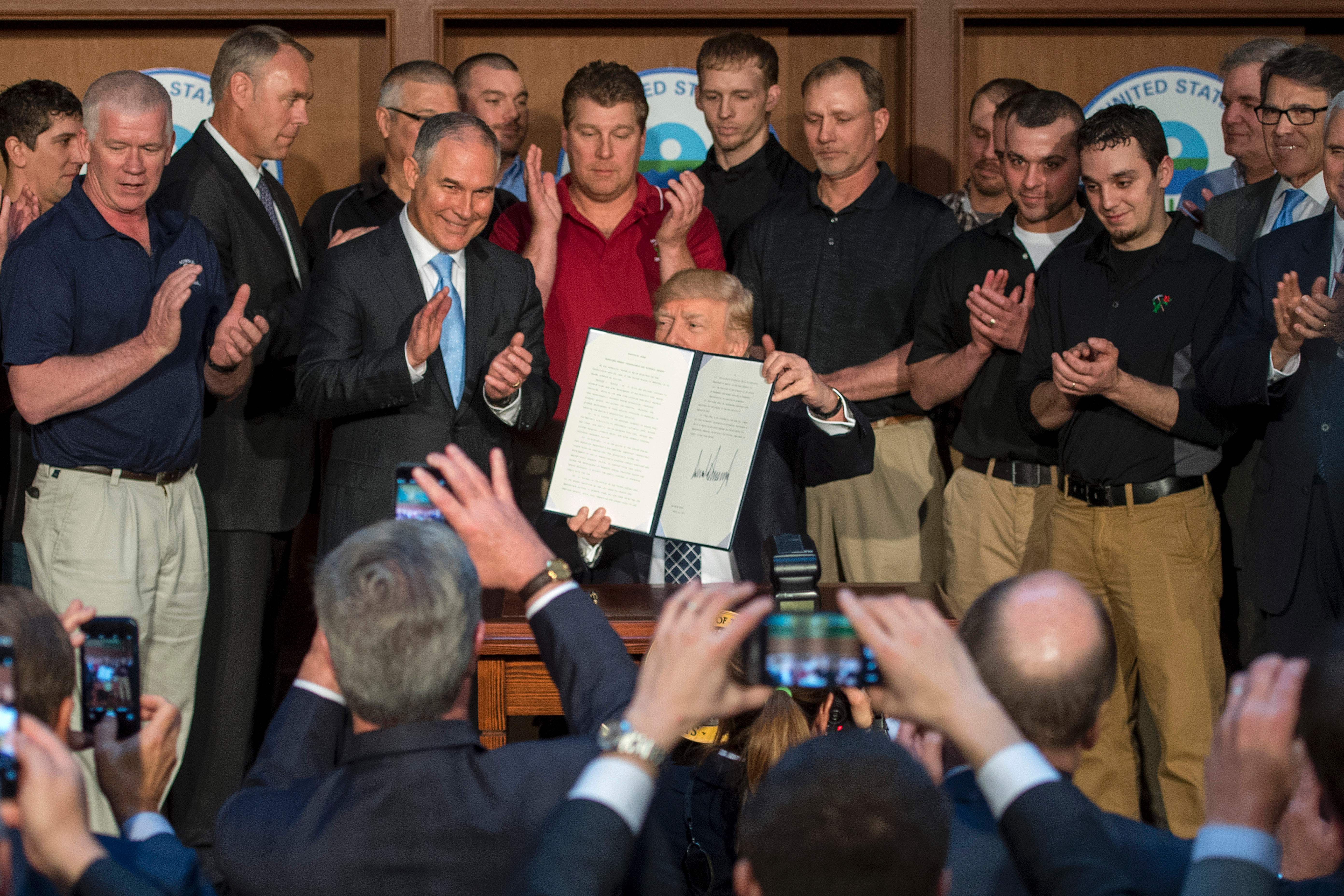While you weren't paying attention, the GOP gutted key parts of Obama's legacy
Look at all the ways the GOP has quietly been dismantling Obama-era regulations


President Trump and the Republican Party have suffered some headline-grabbing setbacks recently. But while much of the country was watching transfixed as courts swatted down the president's travel ban, and as the GOP's repeal of ObamaCare went down in flames, Republican lawmakers were also quietly hard at work elsewhere.
During President Obama's tenure, and especially near the end, his administration rolled out a host of new regulations to protect Americans from the ravages of big business. While Congress has to write the laws that call for regulations, it's up to the executive branch to enforce them through specific rulemakings. Trump and the GOP have decided that many of Obama's rulemakings have to go.
There's a little-known law, called the Congressional Review Act (CRA), that allows the House and Senate to nix new executive rules they don't like within 60 legislative working days of their enactment. This just requires simple majorities, so the Senate filibuster doesn't come into play. The president still has to sign off too, and a sitting executive who signed a regulation into law isn't likely to undo it. As a result, the CRA was almost never used before now.
Subscribe to The Week
Escape your echo chamber. Get the facts behind the news, plus analysis from multiple perspectives.

Sign up for The Week's Free Newsletters
From our morning news briefing to a weekly Good News Newsletter, get the best of The Week delivered directly to your inbox.
From our morning news briefing to a weekly Good News Newsletter, get the best of The Week delivered directly to your inbox.
But with their takeover of the House, Senate, and White House, Republicans have a brief window of time to deploy the CRA as much as they can to dismantle Obama-era rules that were recently enacted (or haven't been enacted yet). They aren't letting it go to waste.
Here's a rundown of things the GOP has already done, or is about to do.
Made it easier for federal contractors to violate workplace rules without getting in trouble: Wage theft, unsafe conditions, and violations of labor rights are rife in American employment. Federal contractors, who employ 22 percent of the workforce, are no exception. So the Obama White House forced employers vying for federal contracts worth $500,000 or more to disclose all their violations over the past three years — and lose contracts if they weren't up to snuff. That rule is gone now.
Made it easier for everyone to violate workplace rules without getting in trouble: The Occupational Safety and Health Administration (OSHA) used to have six months to cite and fine companies for workplace injuries and deaths. Since OSHA is already woefully understaffed, this gave employers enormous leeway to abuse workers. So Obama's team extended OSHA's window to five years. But Republicans decided that was far was too much paperwork for well-to-do business owners. So both houses of Congress nixed it, and the resolution awaits Trump's signature.
Nixed rules that stop water from being polluted: The coal industry involves a lot of potential pollution, chemicals, and hazardous debris. If that stuff gets into local streams and waterways, it can damage ecosystems and pollute Americans' drinking water. So the Obama administration toughened monitoring of mining operations. They also said mining companies have to restore environments they destroy, and they cracked down on practices that make pollution more likely. All that is toast now.
Erased a rule that limits methane gas leaks: Methane leaks are common in the natural gas industry, either through unintentional breaches, or intentionally burning off inconvenient sources. "Data show that companies between 2009 and 2014 wasted enough gas to power 5.1 million homes for a year," The Denver Post reported. It also contributes to climate change, since methane is an incredibly potent greenhouse gas. So Obama created a rule limiting the intentional flaring and the unintentional leaks. But again, the GOP House and Senate voted to scrap the rule, and the resolution is ready for Trump's signature.
Made it easier to misuse federal land: The federal government owns hundreds of millions of acres of public land, particularly in the west. Lawmakers have to make regular decisions about what to do with the land, and what companies should get access to mine or drill it, etc. This was often an opaque process. So the Bureau of Land Management issued a new rule to open up the process, giving "sportsmen, local governments, landowners, and residents more input early on," the Post explained. But Republican lawmakers complained the rule increased Washington bureaucracy. (Translation: "It makes it harder for us to scratch the backs of big business by letting them exploit public land.") That rule is dead now.
Let internet service providers sell your data: A new Obama-era rule from the Federal Communications Commission would've required ISPs to get explicit approval from customers before selling data on their browsing history and app usage to third parties. Currently, it works the other way: Customers have to individually and explicitly ask their ISP to not do this. But the Republicans in the House and Senate like the old way just fine, so they voted to kill Obama's rule. Their decision is ready for Trump's signature.
Made it easier for energy companies and foreign governments to engage in shady deals: Sometimes big American energy companies get in bed with authoritarian governments so they can exploit their natural resources, creating problematic entanglements in the process. Secretary of State Rex Tillerson's tenure at ExxonMobil has lately been held up as a prime example of this. Obama's White House ruled under Dodd-Frank authority that those companies needed to be more transparent about who they're paying royalties to. Trump and the GOP, of course, scrapped that one as well.
This doesn't even get into Trump's numerous executive orders endangering various regulations and government investment in jobs. But at least those orders can be undone by the next president. They're also limited by the fact that the executive branch can't rewrite the law unilaterally, only enforce and interpret.
The really pernicious thing about using the CRA is that the results are permanent. According to the law, once the CRA has been used to nix a rulemaking, the executive agency in question is forbidden from going back to the drawing board and creating another rule that's even similar. Of course, a future president and Congress could vote to undo the CRA entirely, but that would require a filibuster. It's an extraordinarily blunt instrument.
That's how Trump and the GOP have been making it permanently easier for powerful interests to screw Americans as workers, as consumers, and as citizens.
Sign up for Today's Best Articles in your inbox
A free daily email with the biggest news stories of the day – and the best features from TheWeek.com
Jeff Spross was the economics and business correspondent at TheWeek.com. He was previously a reporter at ThinkProgress.


